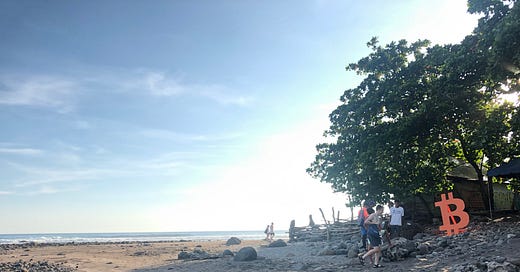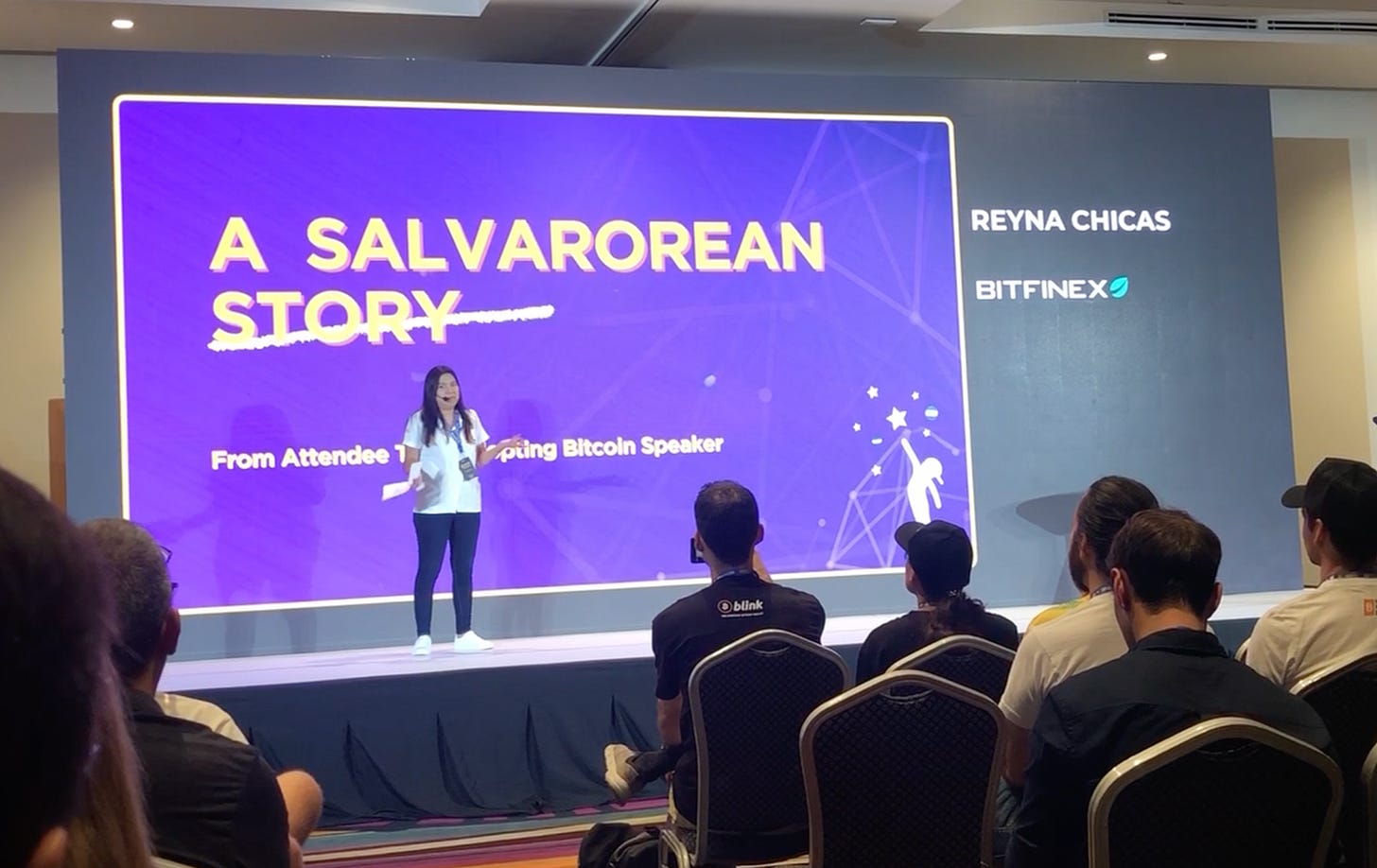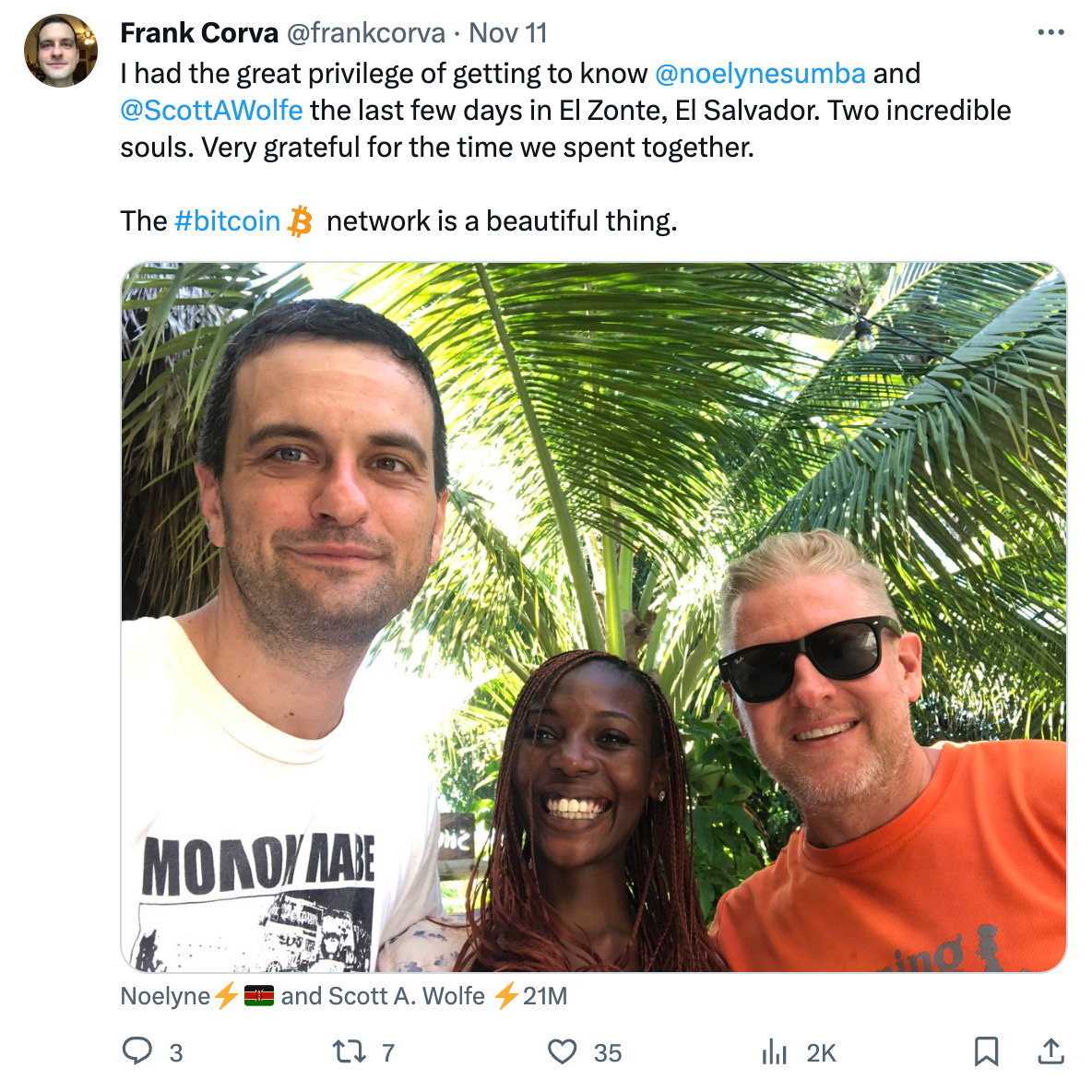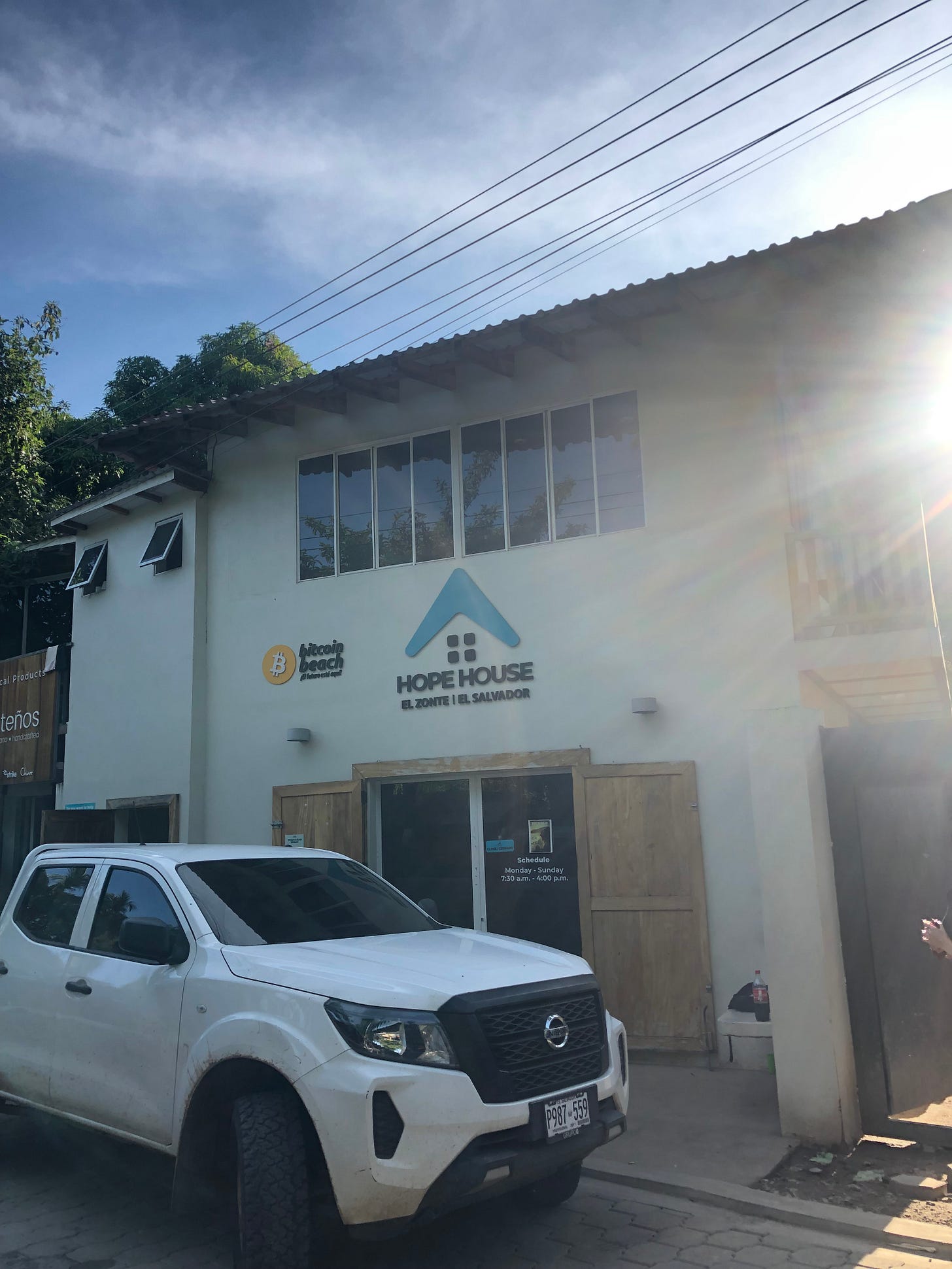Last week, I attended Adopting Bitcoin in San Salvador, El Salvador and then spent a few days in El Zonte, a beach town in the country more colloquially referred to as “Bitcoin Beach”.
Adopting Bitcoin is a conference with a focus on Bitcoin adoption at the community level, and El Zonte was the first community in the world to adopt Bitcoin.
Having heard a lot of competing narratives about what Bitcoin adoption in El Salvador — the first country in the world to make bitcoin legal tender — looks like, I was excited to go there to see it with my own two eyes.
And so in today’s edition of the newsletter, I’ll share with you what I saw and experienced, with a focus on some of the moments that moved me to tears (in a good way).
But, before that, I’d like to start by quickly shattering two illusions:
Illusion #1: Bitcoin Has Saved El Salvador
It hasn’t.
(And I don’t like the word “saved”; it’s highly subjective and paternalistic.)
Very few merchants in the country accept bitcoin, and not many of the everyday people I met seem to care much about it at all. Ironically, many associate Bitcoin with the government, and they feel that Bitcoin was imposed on them by Nayib Bukele, the President of El Salvador, and his administration.
That being said, I met a number of Salvadorans who accept, use and appreciate Bitcoin. Many of them seem to like being a part of the global Bitcoin community and were seemingly happy to engage with the Bitcoin enthusiasts that had come to visit the country for the conference.
If broader Bitcoin adoption is to happen in the country, a lot of education is still needed.
Illusion #2: Nayib Bukele Has Saved El Salvador
85% of Salvadorans approve of Nayib Bukele’s leadership.
I believe he has the highest approval rating of any head of state right now.
He’s maintained this high approval rating despite rebukes from the international community and human rights organizations for his authoritarian method of dealing with criminals, specifically gang members.
Just about every Salvadoran with whom I spoke said that they feel safer in El Salvador in the wake of Bukele’s imprisioning approximately 70,000 gang members earlier this year. They also shared how much they appreciate no longer having to give a percentage of their earnings to gang members and that they enjoy being able to walk outside freely, which many couldn’t do before Bukele’s crackdown.
However, I also heard stories about Salvadorans who have been imprisioned for speaking out against Bukele as well as stories about the social programs he’s cut since taking office. Also, Bukele hasn’t magically changed things overnight for those in the country who earn a minimum wage or a meager salary — those who struggle to make ends meet. Whatever money is flowing into the country as a result of Bukele’s actions has not had much of an impact on the poorest citizens of El Salvador yet.
With all of that said, I still support Bukele, and here’s my take on him:
I think his actions most closely resemble those of Lee Kuan Yew, the former Prime Minister of Singapore whose efforts helped transform Singapore into a business hub. Yew was elected democratically but had some authoritarian tendencies. I’m not sure it’s possible for a leader not to have such tendencies when trying to make sweeping changes in a country. I’m also not here to make any sort of moral judgment on Bukele’s actions, especially as government of my home country, the US, is funding the annihilation of Palestinian children.
If I were Salvadoran, I’d have voted for Bukele, and I’d be quite happy that I did. I like being able to walk around outside without fear of being robbed or harmed physically. I like the idea of living in a business-friendly jurisdiction that attracts bright minds. And I like Bitcoin. Plus, the feeling of hope in El Salvador is palpable. I hardly remember feeling anything like it in my years of travels.
At the same time, I can acknowledge that Bukele’s governance style comes with trade-offs (as do all governance styles) and that there are some downsides to his approach.
Let’s move on.
Tears of Joy
Here are a few of the speakers from the conference who moved me to tears:
Reyna Chicas
Reyna Chicas is a Salvadoran woman who came to Adopting Bitcoin last year as an attendee to learn more about Bitcoin. This year, she returned as the lead-off speaker for the conference.
After being inspired by what she learned at Adopting Bitcoin 2022, she became an instructor at Mi Primer Bitcoin, a Bitcoin education program founded in El Salvador. She also traveled to Guatemala in April 2023 to teach Bitcoin there, as well.
In just one year, she’s made quite a name for herself and was even invited to an all-expense paid trip to Hong Kong for a Bitcoin conference. This was only her second time on a plane. The first was when she went to Guatemala.
She kicked off this year’s conference with an emotional recount of her journey; she gave most of her talk on the verge of tears (as you could hear in her voice and as she told me the following day when we spoke).
During the presentation she thanked her parents — who were there, watching her present to about 400 people — for their support and for paying for her English lessons (she presented in perfect English) when she was younger.
At this point, I broke down. I think most of the audience was right there with me. She had the room in the palm of her hand as she shared her story and acknowledged that while the path she’s on might not be a traditional one, she’s happy and excited to be on it.
I’m happy and excited to say that I’ll be interviewing her for my podcast hopefully this week or next. I think you’ll appreciate what she has to share.
Sébastien Gouspillou
I’ve been following Séb Gouspillou on X (Twitter) for years now. I deeply admire his work.
He manages a Bitcoin mining operation in Virunga, a major national wildlife reserve in the Democratic Republic of the Congo (DRC). The mining set-up is about four hours into the jungle and far from any major village. Also, as Séb shared, it’s located in a region plagued with violence fueled by local militias.
You’re probably thinking, “Okay, so what’s this dude doing mining bitcoin in such a location?” I had wondered the same thing and was lucky enough to learn why as I watched him present on Tuesday.
According to Séb, he’s there — using hydroelectric power (clean energy) to mine bitcoin — for the following three reasons:
To earn money for the park. Séb’s mining operation brings in about $100,000 worth of bitcoin per month. Some of this money goes to the park, and some goes to employing local militia members.
Reducing militia violence. In employing local militia members at the mining operation, he keeps them from 1. fighting other rival militia members and 2. burning down trees in efforts to produce coal (which they can then sell).
Preserving the park’s wildlife and greenery. Bitcoin mining provides jobs to people (the militia members) who would otherwise be slashing and burning the local environment in efforts to make a living. Less environmental destruction is a huge plus for the endangered gorillas who live in the region as well as for Africa at large. The region is often referred to as the “Lungs of Africa,” because it helps stabilize the climate and is as critical to Africa as the Amazon is to Latin America.
And to really drive home how noble this effort is, Séb and his crew put their lives on the line to do this. He mentioned that one of the higher-ups in his crew was actually shot and killed six months ago. Séb was emotional as he shared this and got choked up when he said, “We can’t live in a world where we don’t have Bitcoin mining; it’s too important.”
I’d love to say this was when I broke down, as well, but I already had tears in my eyes by the time he got to this part.
Séb and I connected a bit after his talk. I’m hoping to have him as a guest on the podcast at some point.
Valentin Popescu
Valentin is from Romania but moved to Peru after marrying a Peruvian woman. He’s been working working to help improve the lives of Peruvians long before Bitcoin existed. However, he now uses Bitcoin as part of his strategy as director of the NGO Motiv Peru.

Over 75% of Peru is unbanked. Valentin and his team at Motiv work with many of the people that fall into this 75%.
It was quite clear that Valentin is much more than a Bitcoin evangelist. He deeply cares about those with whom he works.
During his talk, he stressed the importance of serving others, being grateful and going where others don’t want to go to help.
At one point during his talk, he brought up a slide with a picture of four children on it, and when he glanced back at it, he got choked up and had to pause. He composed himself amidst the audience’s applause, and then shared that these children had been the victims of some type of violence/abuse (I don’t remember the details, because I was quite choked up myself) and recounted what a privilege it has been to be there for them.
We spoke for a bit after his talk as well as in El Zonte, and he’s agreed to come on the podcast. I think you’ll really enjoy what he has to share.
New Friends
Beyond being overwhelmed with emotion during these moments mentioned above, I also had a great time making new friends over the course of the week, two of which are Noelyne Sumba and Scott Wolfe.
Noelyne Sumba
I’ve been following Noelyne online for about a year, since when she was first interviewed by Nik Bhatia for The Bitcoin Layer (She’s now the Africa correspondent for the platform.)
She works for/with Machankura and Azteco, two awesome Bitcoin companies whose founders I deeply admire.
She gave an excellent talk at the conference on the importance of Bitcoin adoption in her home country, Kenya, and throughout Africa.
It was lovely getting to know her. She’s brave, wise beyond her years and incredibly kind.
Scott Wolfe
I’ve been following Scott on Twitter for some time, too. He has a background in public health and is interested in working with the Bitcoin circular economics around the world, much like I am.
He’s also currently working on developing the Bitcoin Coalition Canada, a non-profit that aims to bring awareness to the economic, social and environmental benefits of Bitcoin.
Like many of the people I met at the conference who have been doing public service work long before they found Bitcoin, Scott is compassionate and eager to engage with the people with whom he works.
It felt quite serendipitous that Noelyne, Scott and I randomly booked rooms not only in the same hotel but right next to one another in El Zonte. So, we ended up spending a lot of time together during the latter part of the trip.
As I said, it was an honor to get to know them. And I’m excited to see Noelyne again when I head out to the African Bitcoin Conference in Ghana at the end of this month.
Hope House
On Friday, Noelyne, Scott and I went to Hope House — a community center in El Zonte — to sit in on an ESL lesson.
As I conversed with a small group of the students, memories and feelings related to the 12 years I spent teaching came back to me.
I realized how much I miss engaging with people in person (as opposed to engaging with my computer screen and keyboard 8-10 hours per day as a writer/podcast host).
Maybe it’s time for me to make some space for that again.
Final Thoughts
I’ve been into Bitcoin for almost 6 years now but have been hesitant to to go conferences. There’s something about the big Bitcoin conferences that rub me the wrong way. Maybe it’s the 20,000 middle-aged white dudes in an arena screaming about how they aren’t free enough. Who knows? (It’s a joke.)
Adopting Bitcoin — a smaller conference with a community focus — was more my speed. And it was great to see what’s happening in El Salvador — El Zonte in particular — with my own two eyes.
It’s very cool that Bitcoin is legal tender in El Salvador but this alone isn’t going to “save” the country.
More education is needed is Bitcoin if to have a broader effect there.
With that said, though, Bitcoin is surely having some effect in El Salvador, especially on some the Salvadorans with whom I spoke.
I truly hope Bitcoin does better the lives of the Salvadorans who plan to hold it and transact with it. I plan to do my part in continuing to support Bitcoin and the Salvadorans with whom I’m now connected because of Bitcoin.
If any of the Salvadorans I met are reading this, I’d like to say gracias desde el fondo de mi corazón for welcoming me to your beautiful country. You’ve inspired me, and I’m grateful to share this Bitcoin space with you.
Here’s to a new day rising in El Salvador.
¡Vamanos!
Best,
Frank
Nostr | X (Twitter) | LinkedIn | YouTube | Instagram | Spotify | Apple Podcasts | Fountain
P.S., To paid subscribers, I will send out a market update either later today or tomorrow.










